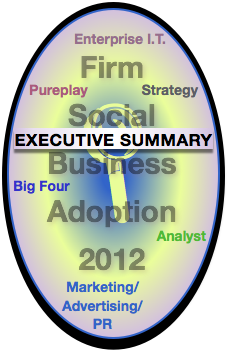 Advisory & Services Firm Social Business Adoption 2012 is a research survey that looks at social business advisory/consulting firms in a new way. Using quantitative methods, I compared consultancies according to the needs of clients who want to transform their organizations with social business. The twelve metrics measure firms’ performance in business impact, sociality, and transformation areas, and they rank firms within firm categories and overall. Advisory & Services Firm Social Business Adoption 2012 is a research survey that looks at social business advisory/consulting firms in a new way. Using quantitative methods, I compared consultancies according to the needs of clients who want to transform their organizations with social business. The twelve metrics measure firms’ performance in business impact, sociality, and transformation areas, and they rank firms within firm categories and overall.
Now prospective clients can compare Strategy firms, Big Four firms, Agencies, Analysts, Enterprise IT firms, and Pureplays quantitatively. Moreover, consulting firms can use these metrics for guidance in building out their social business practices.
I launched CSRA in 2006, and we have always practiced social business as transformation. Client work in social business transformation enables me to see where the market is going, so this survey considers social business firms from that future state.
[UPDATE 8 Mar] Now available: “Executive Briefing” is even more summarized (14-slides) in two versions: Guidance for Clients and Guidance for Firms. Research survey results will be most useful if you […]
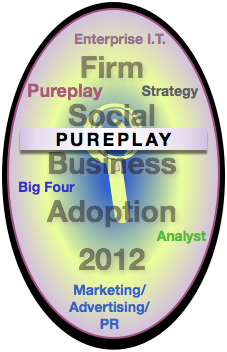 Pureplays address social business as transformation by definition because they have been launched to address emerging market needs that established players either do not yet understand or have yet to organize to address. Moreover, Pureplays are not adding social business to their existing services; they have been formed to practice social business. They are a small cohort in this research survey because they were constrained to social business and transformation as were advisory firms in other categories. Pureplays address social business as transformation by definition because they have been launched to address emerging market needs that established players either do not yet understand or have yet to organize to address. Moreover, Pureplays are not adding social business to their existing services; they have been formed to practice social business. They are a small cohort in this research survey because they were constrained to social business and transformation as were advisory firms in other categories.
Pureplay firms are often smallish startups, so they are quite limited in some areas when compared to established legacy firms as in this research survey. From a market and client perspective, Pureplays represent a vital part of the market and can offer unique capabilities; however, clients need to approach them with “eyes wide open” because the way they serve clients varies considerably.
There are thousands of social media advisory Pureplay firms that are focused on marketing and promotion. Pureplays’ capabilities are largely colored by their founders’ backgrounds. Dachis Group, SideraWorks and SocialxDesign directly […]
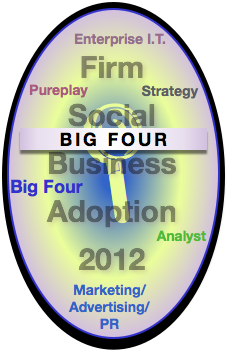 [UPDATED] The Big Four accountancies have been rebuilding their advisory practices for the past several years, and social business transformation fits with their core competencies in important ways. Like Strategy firms, they have been watching adoption and producing thought leadership on various aspects of social technologies’ relevance to business. Their approach also resembles that of strategy firms in that they have relatively low evidence of social business practice. [UPDATED] The Big Four accountancies have been rebuilding their advisory practices for the past several years, and social business transformation fits with their core competencies in important ways. Like Strategy firms, they have been watching adoption and producing thought leadership on various aspects of social technologies’ relevance to business. Their approach also resembles that of strategy firms in that they have relatively low evidence of social business practice.
Big Four firms are well positioned to evolve into social business consultancies because they have core competencies in business strategy and business process transformation. However, they will be challenged by their relative lack of core communications skills and awareness of “soft” social, people and behavioral knowledge.
Deloitte has been an early adopter of social business as a concept, perhaps because it did not shed its consulting practice in the early 2000s as all others did. PwC acquired boutique social business consultancy Ant’s Eye View in 2012, which shows its intention to integrate social business more deeply into its Customer Impact practice.
[…]
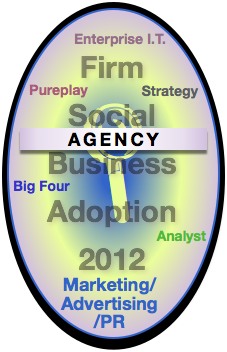 [UPDATED] Marketing, advertising and public relations (MAP) agencies have comprised the largest share of the “social” advisory and execution firms for many years. Most of the other advisory firms are relative late entrants, with the exception of some Analyst and Enterprise I.T. firms. Communication forms the core of social technologies, and MAP agencies have been pivotal in leading the growth of social media activity in their clients, many of the largest brands in the world. [UPDATED] Marketing, advertising and public relations (MAP) agencies have comprised the largest share of the “social” advisory and execution firms for many years. Most of the other advisory firms are relative late entrants, with the exception of some Analyst and Enterprise I.T. firms. Communication forms the core of social technologies, and MAP agencies have been pivotal in leading the growth of social media activity in their clients, many of the largest brands in the world.
However, this research survey argues that, although social media will remain an important portion of the total economic value produced by using social technologies, it will devolve into a minority portion. Collaboration and pervasive innovation will be the majority, which will require enterprise business process transformation. MAP agencies lack competencies in management consulting and enterprise transformation, so they are in an ambiguous situation, being the leaders in social media, a shrinking market in the medium to long term. This report shows how agencies can navigate these rapids and how their clients might best partner with them […]
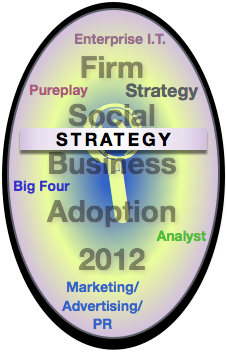 [UPDATED] Strategy firms are the most trusted names sought by CEOs and boards of directors who are reevaluating their companies’ identities, strategies and operations. Strategy firms have been making measured investments in social business over the last few years. Their knowledge of enterprise transformation is deep and broad, and they all have proprietary methodologies for most aspects of the strategy and transformation life cycle. They have deep and broad expertise in market analysis, competitive analysis corporate core competency analysis and virtually all aspects of operations. Many firms have large business transformation practices that explicitly guide clients through profound redefinition and change. [UPDATED] Strategy firms are the most trusted names sought by CEOs and boards of directors who are reevaluating their companies’ identities, strategies and operations. Strategy firms have been making measured investments in social business over the last few years. Their knowledge of enterprise transformation is deep and broad, and they all have proprietary methodologies for most aspects of the strategy and transformation life cycle. They have deep and broad expertise in market analysis, competitive analysis corporate core competency analysis and virtually all aspects of operations. Many firms have large business transformation practices that explicitly guide clients through profound redefinition and change.
Strategy firms have extensive core competencies that could enable them to offer social business strategy services. In addition, Strategy firms are significant producers of thought leadership relevant to corporate and business strategy as well as operations. Most firms field high quality management journals whose papers are written by their consultants. Many have research boutiques or even full-fledged businesses for research and thought leadership. However, they are challenged by very conservative […]
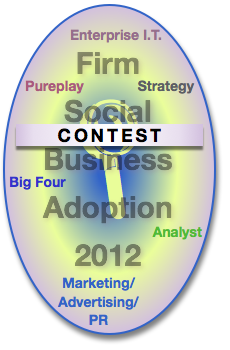 Advisory and Services Firm Social Business Adoption 2012 is publishing as individual Executive Summaries of firm category reports. These discuss relative scores of firms in each category, but they don’t disclose scores themselves. This enables us to have some fun. You can guess the highest scores in several categories and win valuable prizes! Advisory and Services Firm Social Business Adoption 2012 is publishing as individual Executive Summaries of firm category reports. These discuss relative scores of firms in each category, but they don’t disclose scores themselves. This enables us to have some fun. You can guess the highest scores in several categories and win valuable prizes!
Contest Rules
To be eligible for 1st, 2nd or 3rd prizes, all you need do is respond to four questions via the embedded survey below. You could win an Extended Analysis report of any firm in this Research Survey, or even commission your own Extended Analysis report! For five minutes of your time.
I will award prizes two days after the last Executive Summary publishes (see the Research Survey microsite for dates). However, the first person who responds with the correct answer wins that prize. This introduces some risk for people who just wait until the end! You should also know that I reserve the right to change any of the rules or prizes without notice except on this […]
![Social Media Upgrade [Social Business Team Building] case1](http://rollyson.net/wp-content/uploads/2013/04/sbtb1.png) [Updated] The Social Media Upgrade applies to most consumer-oriented brands that have been outsourcing much of their social media work to agencies. In 2013, digital marketing and brand executives are thinking about building their internal teams to provide more continuity and scale. [Updated] The Social Media Upgrade applies to most consumer-oriented brands that have been outsourcing much of their social media work to agencies. In 2013, digital marketing and brand executives are thinking about building their internal teams to provide more continuity and scale.
Social Media Upgrade is the first of the five-part social business team building series The series describes team building in the context of various scenarios in which firms build social business capability, step by step, while investing wisely. Social Business Strategy Use Cases outlines and compares all five use cases while Social Business Team Building gives general guidance for how to create social business teams as well as recommendations for what characteristics leaders have, so I recommend reading them, too.
[…]
 It is exciting to see widening recognition that brand survival depends on improving the lives of customers, not merely “pushing product” as they are accustomed to doing. In the latest example, Business Should Focus on Sociality, Not Social “Media”, Umair Haque offered a case for the end of social media and the disruption of many Industrial Economy structures, namely the social contract. It is exciting to see widening recognition that brand survival depends on improving the lives of customers, not merely “pushing product” as they are accustomed to doing. In the latest example, Business Should Focus on Sociality, Not Social “Media”, Umair Haque offered a case for the end of social media and the disruption of many Industrial Economy structures, namely the social contract.
As regular readers well know, I agree with Haque’s key thesis, that brands need to jettison their legacy focus on products/services in favor of dedicating themselves to helping users achieve outcomes while using their products. I have often written that humans and their organizations will have to adopt a more collaborative and responsible attitude and approach in general. However, I don’t agree with him that there’s only one way to do “sociality” as he implies by his assertion that brands have an “existential responsibility” to “the art of living.” Here I’ll explain the differences, which will help brand stewards understand the nuances of brands’ disruption.
[…]
 I covered the Federal Reserve Bank of Chicago Economic Forecast last week, where all speakers issued this refrain: “More of the same.” Key economic indicators have been stuck in neutral—the proverbial “sideways” movement—so the consensus in the room was one of faint frustration tempered by gratitude. Everyone had lived through worse. I covered the Federal Reserve Bank of Chicago Economic Forecast last week, where all speakers issued this refrain: “More of the same.” Key economic indicators have been stuck in neutral—the proverbial “sideways” movement—so the consensus in the room was one of faint frustration tempered by gratitude. Everyone had lived through worse.
The current “recovery” is underperforming any other in recent memory according to many measures, especially employment.
The conference was very well organized and featured expert presenters. Reading between the lines, I perceive significant opportunity that will surprise most people. After my notes of speakers’ remarks, I’ll share my thoughts on 2013’s opportunity that is evident when one regards “the economy” from a different point of view.
Everyone wonders what kind of presents we will open in 2013 (right).
[…]
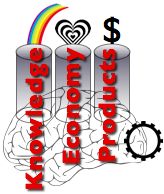 [UPDATED] Several profound market forces are preparing the ascendancy of Knowledge Economy products, which result from collaboration among designers, artists, engineers, customers and firms. This represents one of the Knowledge Economy’s most exciting-yet-disruptive elements: “products” will cease to be dominated by monolithic factories that mass produce virtually all items that people use and consume. Moreover, people have an inherent joy when they can make things for themselves, their friends and their families—and a dramatic new wave of creativity and innovation is imminent. To help you wrap your mind around Knowledge Economy products, this post will recall what happened to mass media and entertainment industries. [UPDATED] Several profound market forces are preparing the ascendancy of Knowledge Economy products, which result from collaboration among designers, artists, engineers, customers and firms. This represents one of the Knowledge Economy’s most exciting-yet-disruptive elements: “products” will cease to be dominated by monolithic factories that mass produce virtually all items that people use and consume. Moreover, people have an inherent joy when they can make things for themselves, their friends and their families—and a dramatic new wave of creativity and innovation is imminent. To help you wrap your mind around Knowledge Economy products, this post will recall what happened to mass media and entertainment industries.
Knowledge Economy products are conceived, designed, prototyped and fabricated in the Social Channel. Best practices in open source, Agile development, design and Web development will unleash continuous innovation at a scale and pace we’ve never seen before. Knowledge and innovation will be free in the Knowledge Economy because all supporting processes will become an order of magnitude faster and cheaper. Firms and brands that do not recognize and respond quickly enough will become irrelevant.
Most brands […]
|
|
 Advisory & Services Firm Social Business Adoption 2012 is a research survey that looks at social business advisory/consulting firms in a new way. Using quantitative methods, I compared consultancies according to the needs of clients who want to transform their organizations with social business. The twelve metrics measure firms’ performance in business impact, sociality, and transformation areas, and they rank firms within firm categories and overall.
Advisory & Services Firm Social Business Adoption 2012 is a research survey that looks at social business advisory/consulting firms in a new way. Using quantitative methods, I compared consultancies according to the needs of clients who want to transform their organizations with social business. The twelve metrics measure firms’ performance in business impact, sociality, and transformation areas, and they rank firms within firm categories and overall.
 Pureplays address social business as transformation by definition because they have been launched to address emerging market needs that established players either do not yet understand or have yet to organize to address. Moreover, Pureplays are not adding social business to their existing services; they have been formed to practice social business. They are a small cohort in this research survey because they were constrained to social business and transformation as were advisory firms in other categories.
Pureplays address social business as transformation by definition because they have been launched to address emerging market needs that established players either do not yet understand or have yet to organize to address. Moreover, Pureplays are not adding social business to their existing services; they have been formed to practice social business. They are a small cohort in this research survey because they were constrained to social business and transformation as were advisory firms in other categories. [UPDATED] The Big Four accountancies have been rebuilding their advisory practices for the past several years, and social business transformation fits with their core competencies in important ways. Like Strategy firms, they have been watching adoption and producing thought leadership on various aspects of social technologies’ relevance to business. Their approach also resembles that of strategy firms in that they have relatively low evidence of social business practice.
[UPDATED] The Big Four accountancies have been rebuilding their advisory practices for the past several years, and social business transformation fits with their core competencies in important ways. Like Strategy firms, they have been watching adoption and producing thought leadership on various aspects of social technologies’ relevance to business. Their approach also resembles that of strategy firms in that they have relatively low evidence of social business practice. [UPDATED] Marketing, advertising and public relations (MAP) agencies have comprised the largest share of the “social” advisory and execution firms for many years. Most of the other advisory firms are relative late entrants, with the exception of some Analyst and Enterprise I.T. firms. Communication forms the core of social technologies, and MAP agencies have been pivotal in leading the growth of social media activity in their clients, many of the largest brands in the world.
[UPDATED] Marketing, advertising and public relations (MAP) agencies have comprised the largest share of the “social” advisory and execution firms for many years. Most of the other advisory firms are relative late entrants, with the exception of some Analyst and Enterprise I.T. firms. Communication forms the core of social technologies, and MAP agencies have been pivotal in leading the growth of social media activity in their clients, many of the largest brands in the world. [UPDATED] Strategy firms are the most trusted names sought by CEOs and boards of directors who are reevaluating their companies’ identities, strategies and operations. Strategy firms have been making measured investments in social business over the last few years. Their knowledge of enterprise transformation is deep and broad, and they all have proprietary methodologies for most aspects of the strategy and transformation life cycle. They have deep and broad expertise in market analysis, competitive analysis corporate core competency analysis and virtually all aspects of operations. Many firms have large business transformation practices that explicitly guide clients through profound redefinition and change.
[UPDATED] Strategy firms are the most trusted names sought by CEOs and boards of directors who are reevaluating their companies’ identities, strategies and operations. Strategy firms have been making measured investments in social business over the last few years. Their knowledge of enterprise transformation is deep and broad, and they all have proprietary methodologies for most aspects of the strategy and transformation life cycle. They have deep and broad expertise in market analysis, competitive analysis corporate core competency analysis and virtually all aspects of operations. Many firms have large business transformation practices that explicitly guide clients through profound redefinition and change. Advisory and Services Firm Social Business Adoption 2012 is publishing as individual Executive Summaries of firm category reports. These discuss relative scores of firms in each category, but they don’t disclose scores themselves. This enables us to have some fun. You can guess the highest scores in several categories and win valuable prizes!
Advisory and Services Firm Social Business Adoption 2012 is publishing as individual Executive Summaries of firm category reports. These discuss relative scores of firms in each category, but they don’t disclose scores themselves. This enables us to have some fun. You can guess the highest scores in several categories and win valuable prizes!![Social Media Upgrade [Social Business Team Building] case1](http://rollyson.net/wp-content/uploads/2013/04/sbtb1.png) [Updated] The Social Media Upgrade applies to most consumer-oriented brands that have been outsourcing much of their social media work to agencies. In 2013, digital marketing and brand executives are thinking about building their internal teams to provide more continuity and scale.
[Updated] The Social Media Upgrade applies to most consumer-oriented brands that have been outsourcing much of their social media work to agencies. In 2013, digital marketing and brand executives are thinking about building their internal teams to provide more continuity and scale. It is exciting to see widening recognition that brand survival depends on improving the lives of customers, not merely “pushing product” as they are accustomed to doing. In the latest example, Business Should Focus on Sociality, Not Social “Media”, Umair Haque offered a case for the end of social media and the disruption of many Industrial Economy structures, namely the social contract.
It is exciting to see widening recognition that brand survival depends on improving the lives of customers, not merely “pushing product” as they are accustomed to doing. In the latest example, Business Should Focus on Sociality, Not Social “Media”, Umair Haque offered a case for the end of social media and the disruption of many Industrial Economy structures, namely the social contract. I covered the Federal Reserve Bank of Chicago Economic Forecast last week, where all speakers issued this refrain: “More of the same.” Key economic indicators have been stuck in neutral—the proverbial “sideways” movement—so the consensus in the room was one of faint frustration tempered by gratitude. Everyone had lived through worse.
I covered the Federal Reserve Bank of Chicago Economic Forecast last week, where all speakers issued this refrain: “More of the same.” Key economic indicators have been stuck in neutral—the proverbial “sideways” movement—so the consensus in the room was one of faint frustration tempered by gratitude. Everyone had lived through worse. [UPDATED] Several profound market forces are preparing the ascendancy of Knowledge Economy products, which result from collaboration among designers, artists, engineers, customers and firms. This represents one of the Knowledge Economy’s most exciting-yet-disruptive elements: “products” will cease to be dominated by monolithic factories that mass produce virtually all items that people use and consume. Moreover, people have an inherent joy when they can make things for themselves, their friends and their families—and a dramatic new wave of creativity and innovation is imminent. To help you wrap your mind around Knowledge Economy products, this post will recall what happened to mass media and entertainment industries.
[UPDATED] Several profound market forces are preparing the ascendancy of Knowledge Economy products, which result from collaboration among designers, artists, engineers, customers and firms. This represents one of the Knowledge Economy’s most exciting-yet-disruptive elements: “products” will cease to be dominated by monolithic factories that mass produce virtually all items that people use and consume. Moreover, people have an inherent joy when they can make things for themselves, their friends and their families—and a dramatic new wave of creativity and innovation is imminent. To help you wrap your mind around Knowledge Economy products, this post will recall what happened to mass media and entertainment industries.